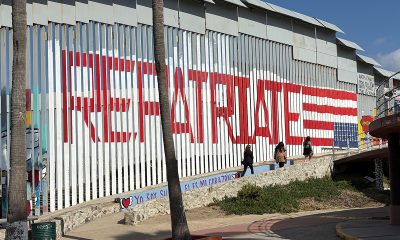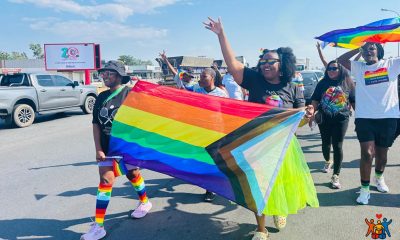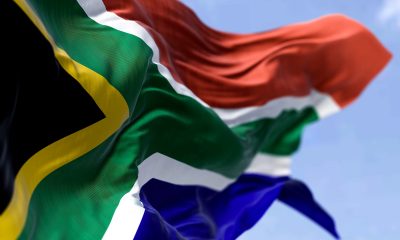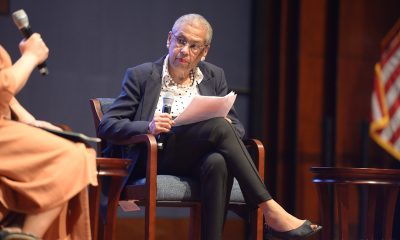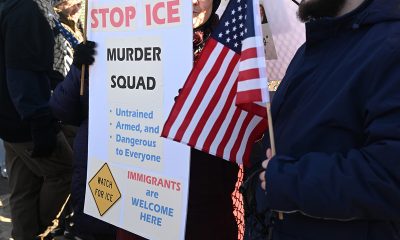Africa
Hundreds attend southern Africa LGBTQ development conference
Activists from Namibia, Botswana among participants
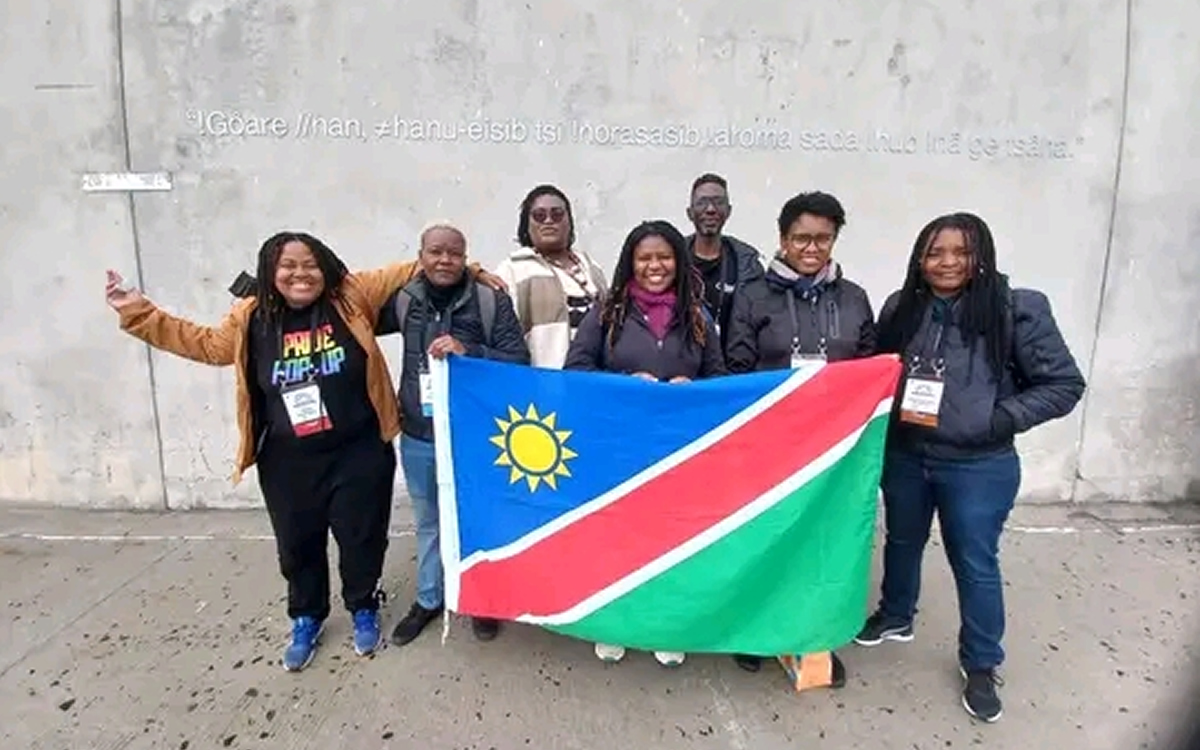
A number of LGBTQ rights groups from across southern Africa participated in a recent conference in Cape Town, South Africa, that focused on how to advance equality in the region against the backdrop of the pandemic.
More than 300 people participated in the conference, titled Kopano, which means “gathering” in Sesotho, the Other Foundation, an NGO that advances equality and freedom in Southern Africa, organized. The themes were rollbacks, resilience, reinvention, reinventing relationships and renewal of connections.
Many of those in attendance acknowledged the harsh realities facing community members that include gender-based violence and other barriers to making a living.
The Namibia Diverse Women’s Association sent 10 representatives to the conference that ended last week.
“Our diversity in representation manifested the comprehension of our national diversity,” it said. “Kopano continues to empower and critically challenge our ways of working.”
“Delegates raised issues such as the importance of collaboration and inclusion in advocacy work in the 2LGBTQIA+ sector,” said Gender DynamiX. “Discussants flagged concerns about businesses and organizations from other sectors engaging in work for their own financial benefit, rather than addressing the underlying problems affecting community members. The current funding system is problematic, as it seeks to profit with the lives of 2LGBTQIA+ people and makes it difficult for smaller organization to get funding.”
Gender DynamiX noted its members “suggested an online toolkit for both business and organizations, setting out how partnerships can help support and sustain the cause without exploiting beneficiaries in the process.”
“Nevertheless, 2SLGBTQIA+ people should also be empowered during these business collaborations, and 2SLGBTQIA+ people in workspaces should use their power to push for the representation and values based on inclusion and equity,” said the group. ” 2SLGBTQIA+ organizations also need to hold themselves accountable. Toxic work environments, internal power-plays, overworking, hierarchal flow of work and lack of compensation undermine the wellbeing of 2SLGBTIA+ activists in organizations.”
Lesbians, Gays and Bisexuals of Botswana (LEGABIBO) also welcomed the conference, and even took note of their visit to Robben Island where former South African President Nelson Mandela spent 18 years in prison.
“We had such an eventful day on Africa Day at the Robben Island Museum,” said LEGABIBO. “This visit was a reminder of how Black people have always had to be resilient in the face of adversity, something that black 2SLGBTQIA+ communities can relate with.”
Kopano organizers also thanked those who attended and paid tribute to activists, especially South African advocate Phumi Mtetwa.
“Thank you all, for making Kopano 2022 a great moment to reconnect and renew our movement,” they said. “As Kopano 2022 came to a close, the southern African 2SLGBTQIA+ activist community gathered in Cape Town paid tribute to our living legend, Phumi Mtetwa. There are a few activists about whom this is truer than Phumi. Her entire being sings, vibrates, reverberates with unbridled love for humanity. Never flinching from dissenting or being critical or questioning but always moved by a great love of justice, fairness, and equality, accompanied by huge doses of laughter and a welcoming smile. She represents for many of us, a bridge over troubled waters and always will. Fearlessly but humbly leading from the front, the side and the rear.”
“To know Phumi is to taste, smell and to touch the society so many of us are struggling for,” added the organizers. “From her work in the National Coalition for Gay and Lesbian Equality (NCGLE) in South Africa, the Equality Project, and in various international organizations and in her personal relations Phumi tirelessly and relentlessly tries to bring everyone on board, sometimes at great cost and sacrifice to herself and her interests. Self-sacrifice is not what she is known to shy away from, giving, sharing and genuinely caring for her comrades, friends and family is what Phumi excels at. Organizing is in her DNA, so she is never satisfied to stop at merely strategic thinking which she has shown herself to be very capable of. We honor you, Phumi Mtetwa, for all that you have done to advance our organizing freedom and wellbeing in southern Africa as 2SLGBTQIA+ people.”
Jholerina Timbo, co-chair of the Transgender Movement of Namibia, was also honored.
Timbo founded Wings to Transcend Namibia in 2015 and was involved in the creation of the Southern African Trans Forum, the International Trans Forum and the African Trans Network. Timbo has also worked with PEPFAR-funded programs and is currently a senior advisor for groups on how they can expand their health programs to better reflect human rights needs.
“She believes that inclusive societies are the key to success for southern Africa,” said the Other Foundation. “If any country needs to show that they care about their people, it should start with the minority. We honor you, Jholerina Timbo, for all that you have done to advance our organizing freedom, and wellbeing in southern Africa as 2SLGBTQIA+ people.”
Daniel Itai is the Washington Blade’s Africa correspondent.
Uganda
LGBTQ Ugandans targeted ahead of country’s elections
President Yoweri Museveni won 7th term in disputed Jan. 15 vote

Barely a week after Ugandan President Yoweri Museveni secured a 7th term in an election marred by state violence, intimidation, and allegations of fraud, the country’s queer community spoke about how the election environment impacted it.
The LGBTQ lobby groups who spoke with the Washington Blade noted that, besides government institutions’ failure to create a safe and inclusive environment for civic participation by all Ugandans, authorities weaponized the Anti-Homosexuality Act to silence dissent and discourage queer voter engagement.
The rights groups note that candidates aligned with Museveni’s ruling National Resistance Movement — including Parliament Speaker Anita Among — during the campaigns accused their rivals of “promoting homosexuality” to discredit them while wooing conservative voters.
Queer people and LGBTQ rights organizations as a result were largely excluded from the formal political processes for the election as voters, mobilizers, or civic actors due to fear of exposure, stigma, violence, and legal reprisals.
“This homophobic rhetoric fueled public hostility and emboldened vigilante violence, forcing many queer Ugandans into deeper hiding during the election period,” Uganda Minority Shelters Consortium Coordinator John Grace stated.
Some queer people had expressed an interest in running for local council seats, but none of them formally registered as candidates or campaigned openly because of safety concerns and local electoral bodies’ discriminatory vetting of candidates.
“UMSC documented at least three incidents of election-related violence or intimidation targeting LGBTQ+ individuals and activists,” Grace noted. “These included harassment, arbitrary detentions, extortions by state and non-state actors, digital cat-fishing, and threats of outing.”
Amid such a militarized and repressive election environment, Let’s Walk Uganda Executive Director Edward Mutebi noted queer-led and allied organizations engaged in the election process through restricted informal voter education, community discussions, and documenting human rights violations.
“Fear of backlash limited visibility and direct participation throughout the election cycle,” Mutebi said. “But despite the hostile environment of work, Let’s Walk Uganda was able to organize a successful transgender and gender diverse youth training on electoral security and safety.”
Museveni’s government escalated its repressive actions during the Jan. 15 elections by shutting down the internet and suspending nine civil society organizations, including Chapter Four Uganda and the National Coalition of Human Rights Defenders, for allegedly engaging in activities that are prejudicial to the security and laws of the country.
The suspension of the rights organizations remains in force, an action both Mutebi and Grace condemn. They say it prevents queer Ugandans from accessing urgent services from the affected groups.
“For the LGBTQ community, the impact has been immediate and deeply harmful. Many of the suspended organizations, like Chapter Four Uganda, were critical partners in providing legal representation, emergency response, and documentation of rights violations,” Grace said.
This has compelled UMSC and its other partners to handle increased caseloads with limited resources, while navigating heightened scrutiny and operational risk.
“The suspension has disrupted referral pathways, delayed urgent interventions, and weakened collective advocacy for marginalized groups and minority rights defenders, which calls for urgent international solidarity, flexible funding, and protection mechanisms to safeguard the work of grassroots organizations operating under threat,” Grace stated.
Mutebi warned that such repressive actions are tyrannical and are indicative of shrinking civic space, which undermines democratic accountability as the promotion and protection of human rights is ignored.
With Museveni, 81, extending his tenure at State House from a landslide win of 72 percent, UMSC and LWU consider a bleak future in the protection of rights for queer Ugandans and other minority groups.
“Without significant political and legal shifts, LGBTQ persons will face continued criminalization, reduced civic space, and heightened insecurity, making sustained advocacy and international solidarity more critical than ever,” Mutebi said. “ It is unimaginable how it feels to live in a country with no hope.”
Grace, however, affirmed the resistance by local queer lobby groups will continue through underground networks, regional solidarity, and digital organizing.
The duo noted that a win by Museveni’s main challenger and rapper, Bobi Wine, who only managed 24 percent of the total votes cast, could have enabled the opening up of civil space and human rights protections in Uganda.
Wine, for his part, spoke in favor of the respect for the rule of law and human rights during his campaign.
“While Bobi Wine’s past stance on LGBTQ rights was inconsistent, his recent shift toward more inclusive rhetoric and international engagement suggested a potential opening for dialogue,” Grace said. “A win might have created space for policy reform or at least reduced state-sponsored homophobia, though structural change would still require sustained pressure and coalition-building.”
Mutebi stated that a change in Uganda’s leadership to a youthful leader like Wine could have offered an opening, but not a guarantee for progress on inclusion and human rights. Mutebi added existing institutionalized and societal homophobia remain in place.
Egypt
Iran, Egypt object to playing in Seattle World Cup ‘Pride Match’
Game to take place on June 26

Iran and Egypt have objected to playing in a “Pride Match” that will take place in Seattle during the 2026 World Cup.
The Egyptian Football Association on Tuesday said it told FIFA Secretary General Mattias Grafström in a letter that “it categorically rejects holding any activities related to supporting (homosexuality) during the match between the Egyptian national team and Iran, scheduled to be held in Seattle, USA, on June 26, 2026, in the third round of the group stage of the 2026 World Cup.” Football Federation Islamic Republic of Iran President Mehdi Taj told ISNA, a semi-official Iranian news agency that both his country and Egypt “protested this issue.”
The 2026 World Cup will take place in the U.S., Canada, and Mexico. The draw took place at the Kennedy Center on Dec. 5.
Iran is among the handful of countries in which consensual same-sex sexual relations remain punishable by death.
The State Department’s 2023 human rights report notes that while Egyptian law “did not explicitly criminalize consensual same-sex sexual activity, authorities regularly arrested and prosecuted LGBTQI+ persons on charges including ‘debauchery,’ prostitution, and ‘violating family values.’” Egyptian authorities “also reportedly prosecuted LGBTQI+ individuals for ‘misuse of social media.’”
“This resulted in de facto criminalization of same-sex conduct and identity,” notes the report.
The 2024 human rights report the State Department released earlier this year did not include LGBTQ-specific references.
Soccer has ‘unique power to unite people across borders, cultures, and beliefs’
The June 26 match between Iran and Egypt coincides with Seattle Pride. The Washington Post reported the Seattle FIFA World Cup 2026 Local Organizing Committee decided to hold the “Pride Match” before last week’s draw.
“As the Local Organizing Committee, SeattleFWC26’s role is to prepare our city to host the matches and manage the city experience outside of Seattle Stadium,” said SeattleFWC26 Vice President of Communications Hana Tadesse in a statement the committee sent to the Washington Blade on Wednesday. “SeattleFWC26 is moving forward as planned with our community programming outside the stadium during Pride weekend and throughout the tournament, partnering with LGBTQ+ leaders, artists, and business owners to elevate existing Pride celebrations across Washington.”
“Football has a unique power to unite people across borders, cultures, and beliefs,” added Tadeese. “The Pacific Northwest is home to one of the nation’s largest Iranian-American communities, a thriving Egyptian diaspora, and rich communities representing all nations we’re hosting in Seattle. We’re committed to ensuring all residents and visitors experience the warmth, respect, and dignity that defines our region.”
The 2034 World Cup will take place in Saudi Arabia.
Consensual same-sex sexual relations remain punishable by death in the country. The 2022 World Cup took place in neighboring Qatar, despite concerns over the country’s anti-LGBTQ rights record.
Eswatini
PEPFAR delivers first doses of groundbreaking HIV prevention drug to two African countries
Lenacapavir now available in Eswatini and Zambia.
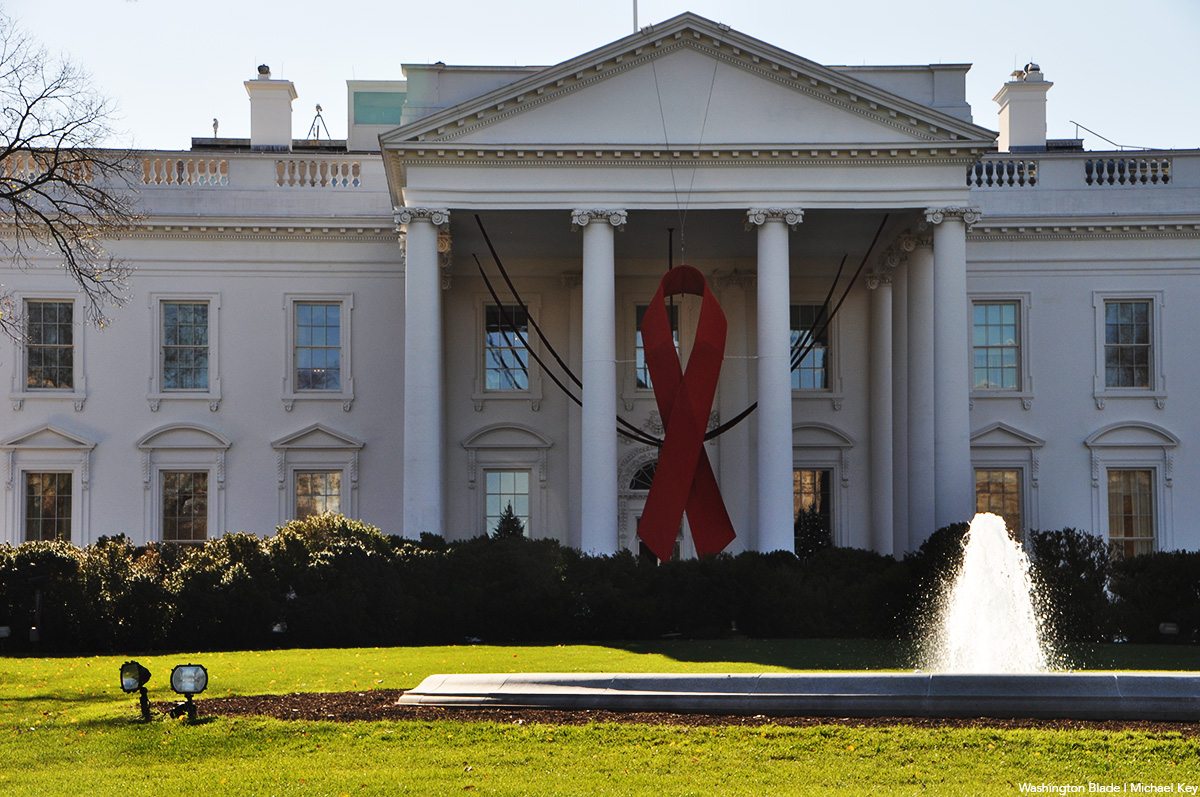
The State Department on Tuesday announced PEPFAR has delivered the first doses of a groundbreaking HIV prevention drug to two African countries.
The lenacapavir doses arrived in Eswatini and Zambia.
The State Department in September unveiled an initiative with Gilead Sciences to bring lenacapavir “to market in high-burden HIV countries.”
Lenacapavir users inject the drug twice a year.
The State Department in its September announcement noted everyone who participated in Gilead’s clinical trials remained HIV negative. It also said lenacapavir “has the potential to be particularly helpful for pregnant and breastfeeding mothers, as it safely protects them during and after pregnancy to prevent mother-to-child transmission.”
“In our new America First Global Health Strategy, the Department of State is establishing a first-of-its-kind innovation fund to support American-led research, market-shaping, and other dynamic advancements in global health,” said PEPFAR on Tuesday in a press release.
“The arrivals of the first doses of lenacapavir in Eswatini and Zambia mark an important milestone in HIV prevention and reflect our commitment to supporting communities with the greatest need,” added Gilead CEO Daniel O’Day. “For the first time, a new HIV medicine is reaching communities in sub-Saharan Africa in the same year as its U.S. approval.”
The September announcement came against the backdrop of widespread criticism over the Trump-Vance administration’s reported plans to not fully fund PEPFAR and to cut domestic HIV/AIDS funding. The Washington Blade has previously reported PEPFAR-funded programs in Kenya and other African countries have been forced to curtail services or even close because of U.S. funding cuts.
-

 Real Estate5 days ago
Real Estate5 days agoConvert rent check into an automatic investment, Marjorie!
-

 Theater5 days ago
Theater5 days agoSwing actor Thomas Netter covers five principal parts in ‘Clue’
-

 District of Columbia4 days ago
District of Columbia4 days agoEleanor Holmes Norton ends 2026 reelection campaign
-

 Opinions4 days ago
Opinions4 days agoICE agents murder another American citizen in Minneapolis

